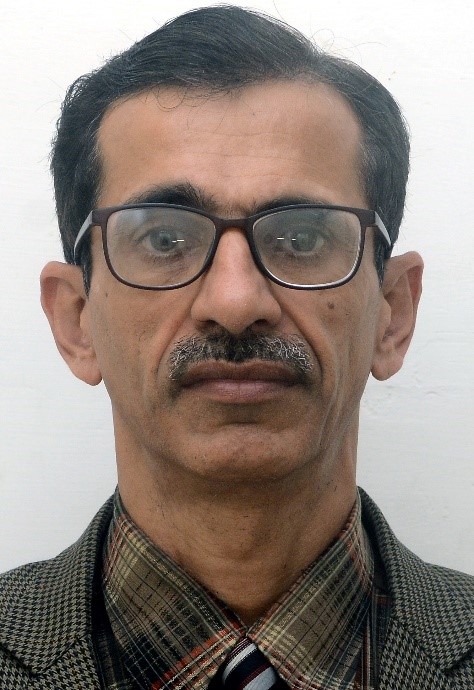
Keynote Speakers

Prof. Jitender Kumar Chhabra
Computer Engineering Department, National Institute of Technology, India
Research Area:SOFTWARE ENGINEERING, SOFT COMPUTING, AI & ML for S/w Engg, DATA CLUSTERING
Brief introduction:Prof Jitender Kumar Chhabra has been working in the areas of software engineering, soft computing, and data clustering for the last 25 years and has published more than 160 papers in reputed journals and conferences. He has also got 4 patents granted, 5 patents published, and 6 copyrights to his credit. He has guided 6 PhDs and 4 are in progress. He has been invited to present his research work in more than 10 countries. He is a reviewer for many reputed journals like IEEE Transactions, ACM Transactions, Applied Soft Computing, and many other reputed journals of IEEE, ScienceDirect, Springer, Wiley, etc. He has delivered more than 25 keynote addresses and chaired more than 30 sessions in reputed international conferences and workshops. He has also completed a research project for the Government of India in the area of secure storage and delivered more than 50. Dr Jitender Kumar Chhabra, Professor, Dept of Computer Engg has been always a topper throughout his career. He has worked in collaboration with many multinational IT companies like IBM, Hewlett-Packard (HP), and Tata Consultancy Services (TCS). He has also authored three international books. He is the first recipient of the Best Teacher Award of NIT Kurukshetra. In addition, he has been awarded many recognitions like the Sir Isaac Newton Scientific Award, Best Educator Award, Bharat Vikas Award, Outstanding Educational Achievement, 21st Century Award for Achievement, Outstanding Intellectual of 21st Century, etc.
Speech Title: Efficient Software Fault Prediction Using Intelligent Feature-Modelling and Computing
Abstract: The IT Industry is one of the fastest growing sectors in the world and most of the work of the IT companies are towards accurate software development and fast maintenance subsequently. Ever growing need for automation and the increasing complexity of multi-disciplinary systems have increased the focus of the IT Industry toward producing good quality software. Identification of fault-prone components can be extremely useful to ensure the quality of the software and thus software fault prediction (SFP) is a promising area for researchers as well as developers. SFP is primarily done by identifying those software characteristics that can lead to fault-proneness. Such characteristics and data need to be captured as well as modeled efficiently, instead of using datasets as a black box. Similarly, intelligent pre-processing and computing over the applicable features can help in getting highly accurate predictions. Various soft computing and machine learning techniques are being used in the literature for predicting faulty software components. Such components can be given more attention during testing as well as the maintenance phase, and thus a better quality product can be developed. This keynote address will provide insight into the intelligent modeling of the features followed by computing using Artificial Intelligence and Machine Learning, to predict fault-prone components of software. It is worth mentioning that the techniques discussed in the talk can be highly useful for predictions in different engineering and analytical models, as proper data modeling and suitable processing as per feature characteristics are keys to success for a prediction model

A. Prof. N. Sasikaladevi
SASTRA University, India
Introduction: Dr. N. Sasikaladevi is currently an Associate Professor in the Department of Computer Science and Engineering, School of Computing, SASTRA Deemed University, India. She received a Ph.D. degree in Computer Science in 2012. She has published more than 42 papers in reputed International journals and conferences including publications in SCI-Indexed Journals. She is a reviewer of more than a dozen reputed journals including IEEE Transactions on Services Computing and IEEE Journal of Internet of Things. Her significant research contribution includes the study of genus-2 and genus-3 Hyper elliptic curves to design the security system for power-constrained devices and applications. Her research focus includes the design of machine learning strategies to solve the Discrete Logarithm Problem. She published several books and chapters in reputed publishers including Prentice Hall of India, Lambert Academic Publisher, IGI Global, Springer, and Science Direct. She has received funds from the Department of Science and Technology, Government of India to carry out projects in the domain of Services computing and Security Systems. She received a Young Scientist award from DST, India. She is also involved in the security-enriched payment system design as a part of the Digital India Initiative. Her current research interests include information security, digital authentication, security of wireless sensor networks, and security of vehicular ad-hoc networks.
Speech Title: Revolutionizing Healthcare: The Synergy of Cloud Computing and Artificial Intelligence for Agile and Personalized Patient Care
Abstract: Cloud computing revolutionizes the healthcare landscape, introducing a new level of adaptability. This transformative technology empowers healthcare providers with the flexibility to efficiently manage resources, responding seamlessly to evolving patient data demands. The resultant agility in the healthcare system is particularly vital in the dynamic realm of medicine. Cloud solutions not only ensure the security of information but also facilitate universal accessibility, fostering collaborative efforts among healthcare professionals and expediting crucial access to patient records. This, in turn, elevates the overall quality of patient care. Furthermore, the integration of artificial intelligence (AI) in healthcare, coupled with the support of cloud-stored data, marks a significant enhancement in patient care. AI's prowess in Diagnosis and Predictive Analytics is evident through rapid analysis of medical images, lab results, and patient records, leading to early disease detection and the formulation of personalized treatment plans. These plans take into account each patient's unique history and genetics, thereby minimizing side effects and optimizing treatment outcomes. The collaborative synergy between AI and cloud computing extends to the realm of Personalized Treatment Plans, tailoring strategies to individual patients and further enhancing the efficacy of treatment.